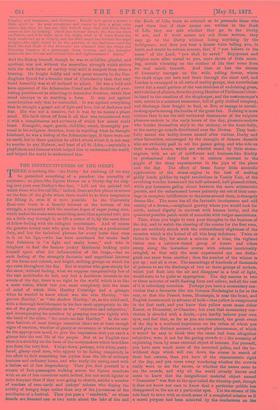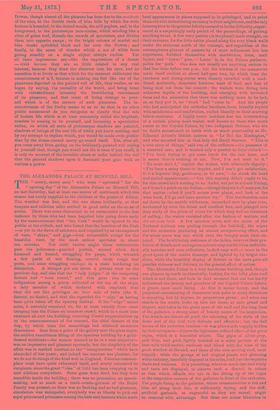THE INSTRUCTIVENESS OF THE DERBY.
TEIERE is nothing like the Derby' for realising (if we may be permitted something of a paradox) the unreality of existence ; no place like Epsom Downs on a Derby-day for ring- ing into your ears Shelley's fine line, "Lift not the painted veil which those who live calllife ;" indeed, there are few places or scenes on the face of the globe where there would be so little temptation for lifting it, even if it were possible. In the University Boat-race there is a homely interest at the bottom of the struggle, a sympathy with the emulous hopes of eager young men, which makes the scene seem something more than a painted veil; you see a little way through it, or lift a corner of it, by the mere force of fellow-feeling with the collegian combatants. And of course the genuine horsey man who goes to the Derby as a professional duty, and has the technical phrases for every horse that runs in it on his lips,—who has been convinced for weeks back that Suleiman is "a light and shelly horse," and who is delighted to find the famous jockey Maidment looking quite himself again after his inflammation of the lungs,—has no such feeling of the strangely fantastic and superficial interest of the forms and colours, and bright, shifting groups on which his eye rests throughout the day. But to anyone who goes simply for the show, without feeling, what we suppose comparatively few of the vast multitudes do feel, any but a factitious interest in the events of the day, there is no sight in the world which is so like a mere vision, which lets you more completely into the state of mind of which little Hartley Coleridge had a glimpse when he wanted to know which was the true Hartley, "the picture Hartley," or "the shadow Hartley," or, as the child said, with a thorough bewilderment in his face most appropriate to the son of the great philosophizer on the "objective and subjective," and accompanying his question by grasping one arm tightly with the hand of the other, "the catch-me-fast Hartley." In the out- door festivals of most foreign countries there are at least enough signs of emotion, whether of gaiety or reverence, or whatever may be the appropriate mood, to give the impression that you catch a glance into the real life of the people. But at an English race there is a stolidity on the faces of the merrymakers which bewilders you from the very first. You go down, perhaps, with white, pasty- faced, glassy-eyed men, who appear to be failing completely in the effort to find something less joyless than the life of ordinary business and ordinary home, and who study the racing-card with a listless air of fast despondency. Then you find yourself in a stream of foot-passengers walking across the Epsom meadows with an air of leas conscious merit indeed, but not much lighter or more buoyant than if they were going to church, amidst a number of vendors of race-cards and jockeys' colours who display the avidity of hungry hope rather than any of the joyousness of the auxiliaries at a festival. Then you pass a "sandwich," on whose boards are flaunted one or two texts about the lake of fire and
the Book of Life, texts so selected as to persuade those who read them that if their names are written in the Book of Life, they are safe whether they go to the Derby or not, and if their names are not there written, they may go to the Derby without losing anything by the indulgence ; and then you hear a hoarse voice telling you, in harsh and would-be solemn accents, that if "you believe in the name" of the Lord, "you shall be saved." Enjoyment and religion seem alike unreal to you, mere shows of little mean- ing, sounds vibrating on the surface of life that come from no real minds beneath. And then at last the stream of humanity emerges on the wide, rolling downs, where the chalk crops out here and there through the short tad, and London is encamped in all sorts of motley groups, that nevertheless cover but a small portion of the vast stretches of undulating grass, and vehicles of all sorts, from the young Member of Parliament's four- in-hand to the omnibus of the skopkeeper, and the coatermongees cart, arrive in a constant succession, full of gaily clothed company, and discharge their freight to feed, or flirt, or engage in unreal- looking sports among the booths of the great fair. Nothing is more curious than to see the still unthawed demeanour of the vulgarer pleasure-seekers in the early hours of the day, pleasure-seekers who betake themselves shyly to the archery, or the Aunt-Sally, or the merry-go-rounds distributed over the Downs. They bash- fully mount the hobby-horses named after various Derby and other favourites, encouraged by the example of demure damsels who are evidently paid to set the games going, and who ride on their wooden horses, which are whirled round by little steam- engines, with an air of indifferent and business-like fidelity to professional duty that is in curious contrast to the giggle of the stray experimenter in the joys of the place and the day. The effect of these fanny little scientifiz applications of the steam-engine to the task of making giddy heads giddier by rapid revolutions in Vanity Fair, of the revolving wooden horses and the half-ashamed, half-pleased riders, while gay horsemen gallop about between the more aristocratic parties, and the unharnessed horses patiently eat out of their nose- bags in complete indifference to the scene around them, is strangely dream-like. The scene has all the fantastic incoherence and odd variety of a dream,—misplaced gravity where you would look for mirth, animal dignity in contrast with human levity, and the quaintest possible patch-work of scientific with vulgar associations.
Then, when you begin to turn your thoughts to the business of the day, and to watch the clearing of the course for the first race, you are suddenly struck with the extraordinary slightness of the occasion which is the kernel of all this busy indolence. Twice or thrice in the day, for about a minute at a time, the vigilant visitor sees a rainbow-tinted group of horses and riders sweep along the horseshoe coarse with colours inextricably mingled, so that only the most experienced eye can distin- guish one racer from another ; then the number of the winner is put up ; and all is over. The assemblage of hundreds of thousands of persons to see the discharge of two or three groups of rockets, which just flash into the air and disappear in a trail of light, would seem to be quite as appropriate. The day centres in two or three minutes of swift-flashing form and colour, and all the rest of it is subsidiary accretion. Perhaps you have a momentary con- viction that a favourite like the German Hochstapler is far in the rear, or that the French horse, Montargis, is near the front, and English horses much in advance of both—that yellow is conspicuous in the first rank, and you know that yellow must mean either Kaiser, or Doncaster, or Chandos ; but even that momentary con- viction is clouded with a doubt,—you hardly believe your own eyes, and feel that, as far as you are concerned, the great event of the day is a confused impression on the retina of which you could give no distinct account, a complex phenomenon, of which it would be easy to think that the cause had been altogether subjective, were it not for the gazing crowds a.-.1 the necessity of explaining them by some external object of interest. For yourself, you have seen much more of the mounted police, and the be- wildered dogs which will run down the course in search of their lost owners, than you hane of the characteristic sight of the day, and you come away wondering whether the crowds really went to see the racers, or whether the racers came to see the crowds, and why all the world already knows and cares to know that the insignificant material object named " Doncaster " was first at the spot called the winning-post, though it does not know nor care to know that a particular pebble has disappeared in the sea at a particular spot. Yet the stream of life sets back to town with as much sense of a completed miaRion as if a moral purpose had been achieved by the rendezvous on the Downs, though almost all the pleasure has been due to the accidents of the race, to the double circle of blue hills by which the wide horizon is bounded, to the dotted woods, the still poplars, and, in the foreground, to the picturesque race-course, which winding like a river of green turf, threads the crowds of spectators, and divides them into opposite camps ; to the bright colours of scarlet and blue cloaks sprinkled thick and far over the Downs ; and finally, to the sense of wonder which a sea of white faces gazing steadily on a single object always excites. Yet all these impressions are—like the impressions of a dream —vivid because they are so little related to any real interest, because they draw the observer into his eyes, and no sensation is so lively as that which for the moment obliterates the consciousness of 'Alf, because in making one feel like one of the phantoms depicted\ ui the painted veil of life, they realise, as we began by saying, i‘e unreality of the world, and bring home with extraordinary intensity the bewildering rootlessness of its pleasures, and that sense of being strange to your- self which is of the essence of such pleasures. The in- structiveness of the Derby seems to us to be that in no other public amusement do you recognise so clearly that the aide of human life which is at least commonly called the brightest, consists in ceasing to be yourself, and becoming a speculative retina, on which all sorts of picturesque shadows are painted, shadows of beings of the real life of which you know nothing, and by any attempt to explore which, you would be made even giddier than by the steam-turned merry-go-round itself. Yet, after all, you come away from gazing on the brilliantly-painted veil saying to yourself that, though you would not lift it even if you could, it is only on account of the invisible chaos or order behind the veil that the painted shadows upon it fascinate your gaze with so curious a power.



































 Previous page
Previous page